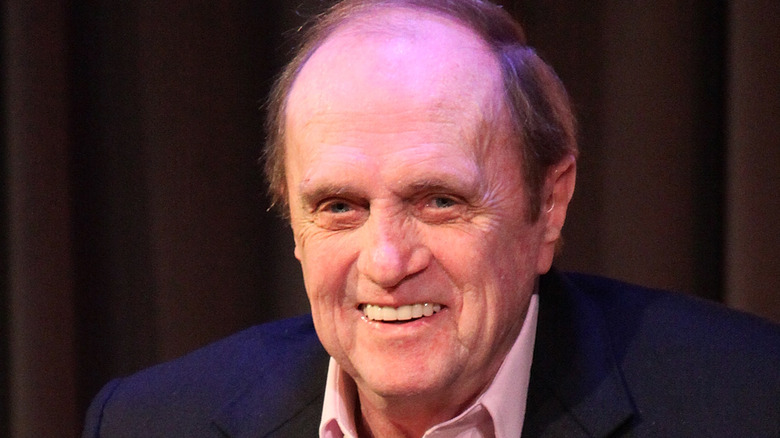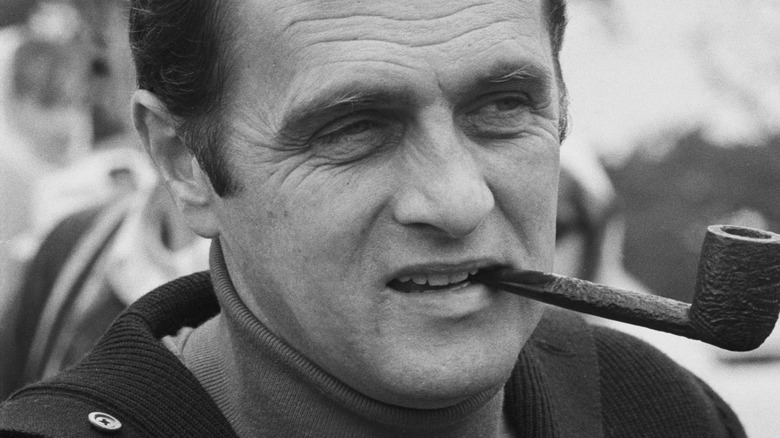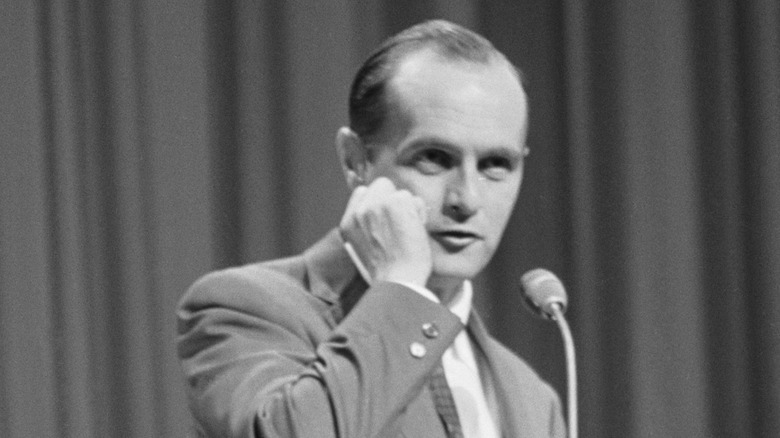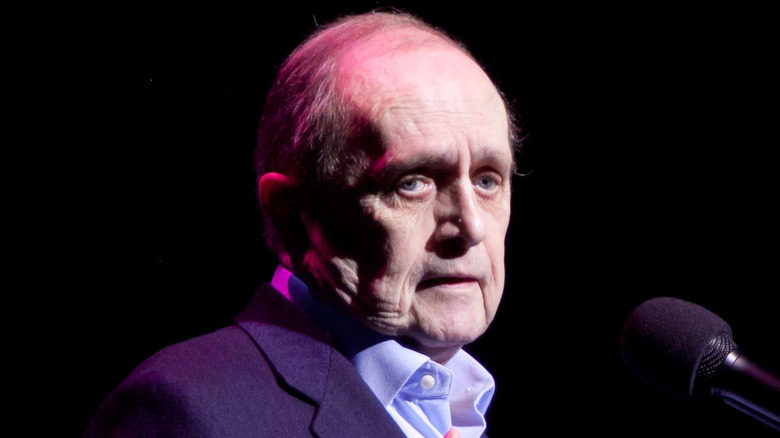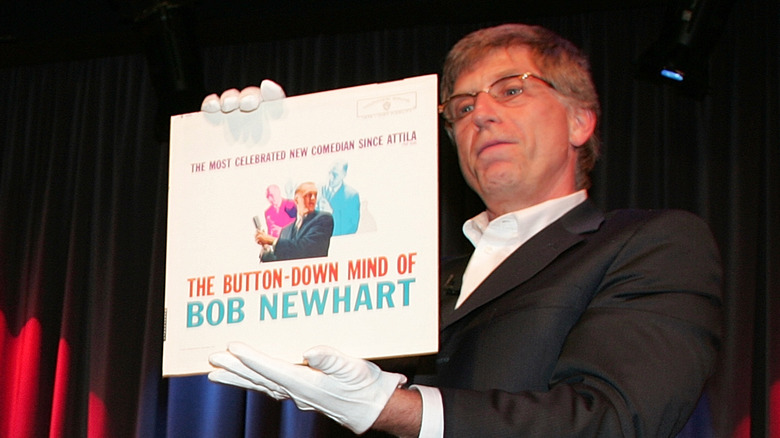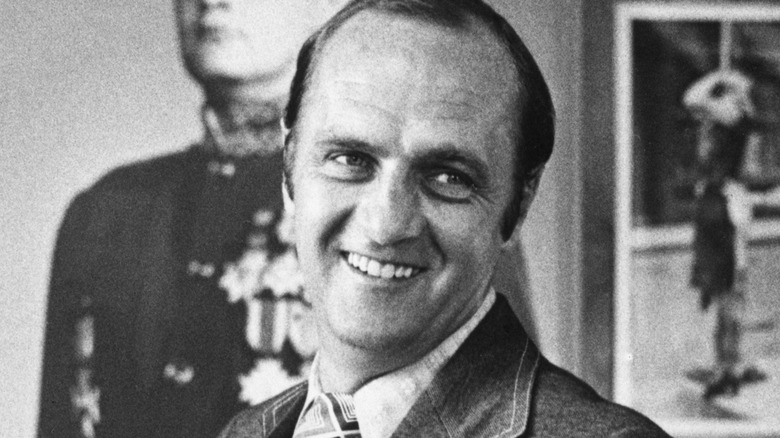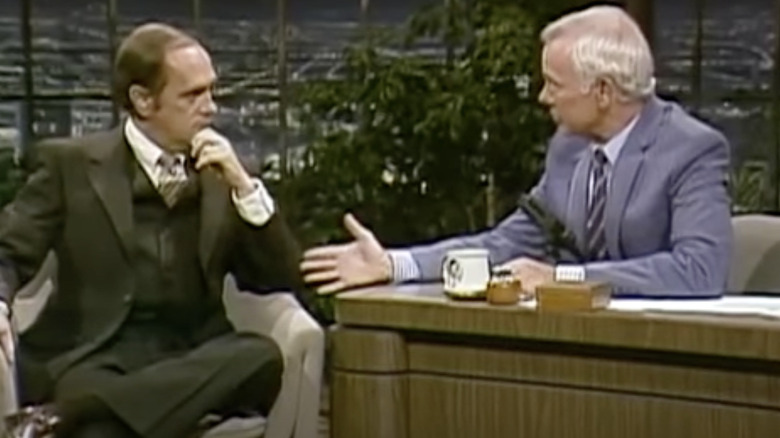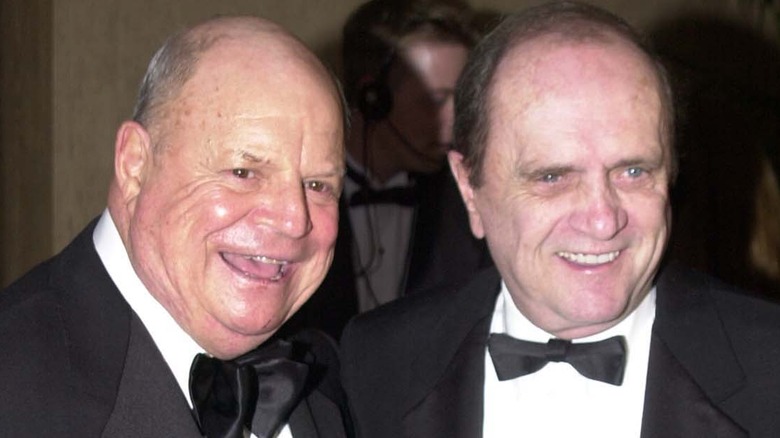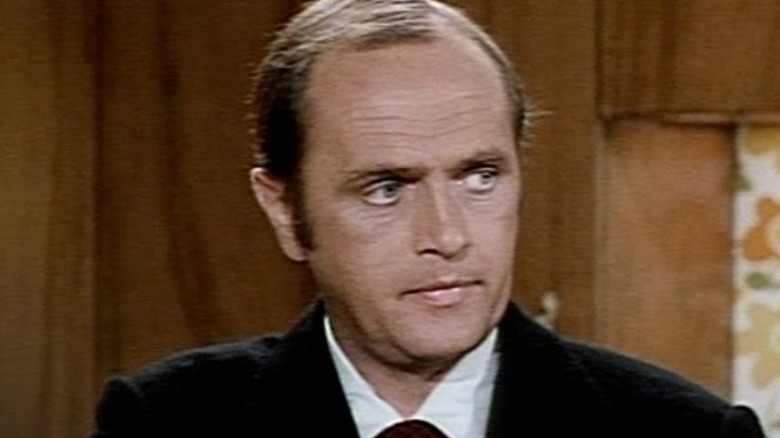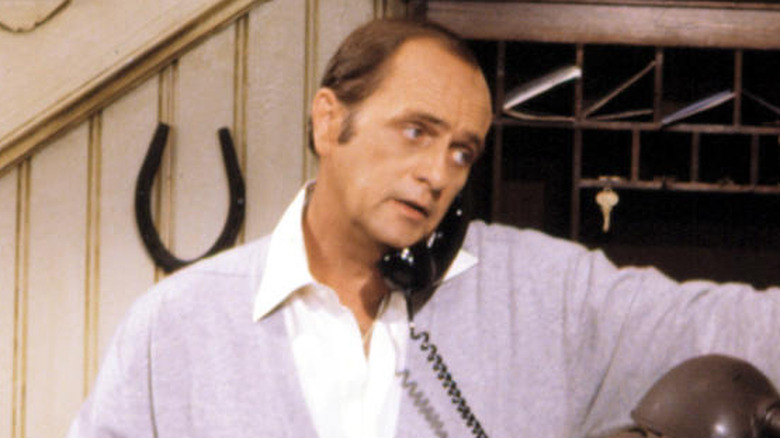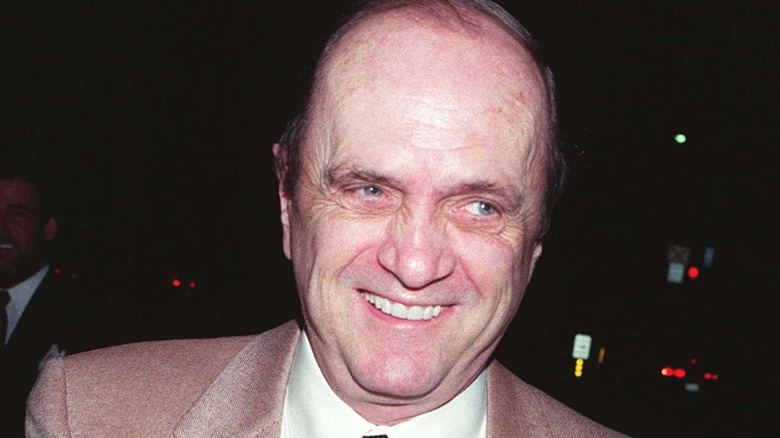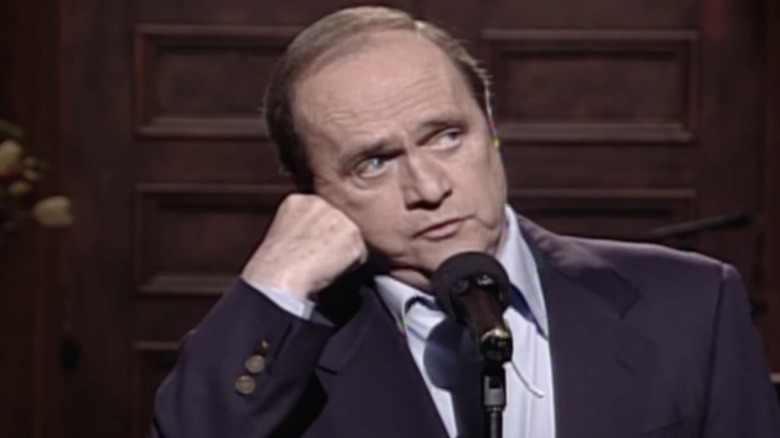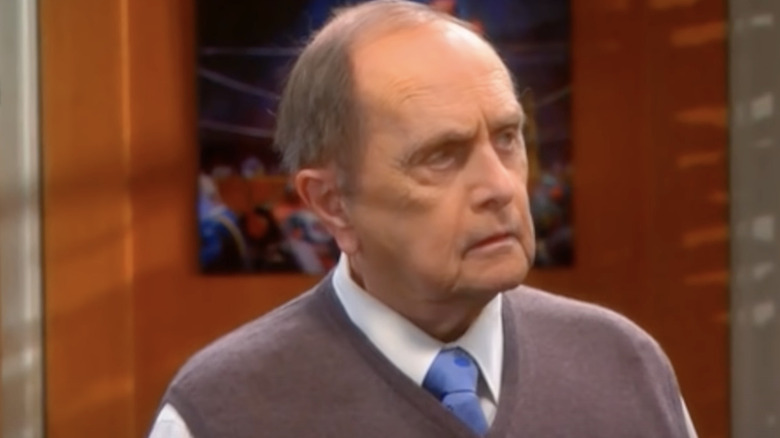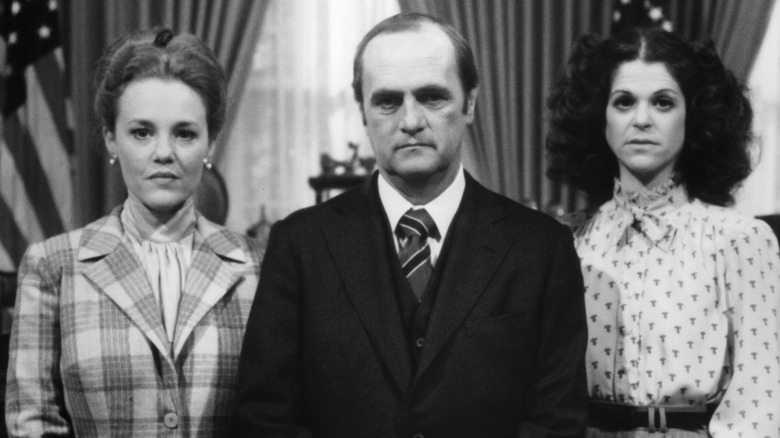Bob Newhart: The Untold Story Of The Legendary Comedian
Stand-up comedy as we know it today — a single performer on a stage, delivering carefully written and rehearsed bits that point out the foibles and absurdities of life — virtually begins with Bob Newhart. In the early 1960s, the dry-witted, soft-spoken, stammering comedian delivered monologues in which he pretended to be on the phone with historical figures and cultural manipulators, garnering big laughs for his intelligent and subversive material. Newhart stayed at the top of the American comedy game for the better part of the 20th century, harnessing his persona and transforming himself into a sitcom star. His name appeared in the titles of two of the best-regarded TV comedies of all time: "The Bob Newhart Show" in the 1970s, and "Newhart" in the 1980s. Newhart helped flesh out the sitcom the same way he helped to define stand-up.
Newhart is an entertainment icon, and he's lived a fascinating if unlikely life. Here's a deep dive into the life, work, inspirations, and impact of Bob Newhart.
He was a terrible accountant
Following his discharge from the U.S. military, Bob Newhart found work as an accountant for the Chicago-based drywall manufacturer U.S. Gypsum, and, after refusing to transfer to Maine, the Glidden Company. One of Newhart's main jobs was to keep track of petty cash and reimburse traveling salespeople for work-related expenses. He could never get the records of cash on hand to balance with the receipts. In his memoir "I Shouldn't Even Be Doing This!," Newhart admitted to staying at work hours into the night trying to reconcile the accounts, until one day he realized he could solve the problem faster. "One day, as everybody was leaving at five and I was facing a couple more hours of work, I pulled the $1.67 that I was short out of my pocket, put it in the cash drawer, and called it a day." Newhart proceeded in that fashion, balancing the records with his own money. He realized accounting wasn't for him, and so he moved into copywriting.
Bob Newhart wasn't always a solo performer
Bob Newhart, going by his first name of George, landed a job writing advertising copy at the Leo Burnett Agency in Chicago, alongside another young writer named Ed Gallagher. They both found the job utterly tedious. "To keep from going out of my mind, I'd call Ed, and we'd do improv routines over the phone. He'd interview me and play the straight man," Newhart told the Tampa Bay Times. "Then he said, 'Why don't we try to sell this to some radio stations?'" Newhart agreed, and after the rest of the ad agency staff would go home at night, they'd use the in-house studio. They taped about five of their bits as demos and mailed them unsolicited to 100 radio stations. Initially, three stations responded positively and put Newhart and Gallagher on the air: one each in Massachusetts, Florida, and Idaho. In "I Shouldn't Even Be Doing This!," Newhart recalled the stations paid him and Gallagher $7.50 each week to record five minutes of original material.
A few months after the duo gained a foothold, Gallagher quit, Newhart wrote. Unlike Newhart at the time, he had a family to support and accepted a well-paying position at a New York agency. That left Newhart a solo act.
He's an accomplished stand-up who never intended to be a stand-up
Bob Newhart continued to record radio material, and after some bits were broadcast in Chicago, popular local radio host Dan Sorkin heard him and hired him to do his routines live on the air. That led to a job hosting the local Emmy Awards, which in turn got Newhart a job in 1958 on a Chicago news show, where a reporter would interview him about current events. "I played a different person every day, and many of the characters were drawn from my unsold radio routines," Newhart explained in "I Shouldn't Even be Doing This!"
Meanwhile, Sorkin handed over some of Newhart's old tapes to George Avakian, a contact at Warner Bros. Records. The label signed Newhart to record a live stand-up comedy record. "There was one small problem," Newhart wrote. "I had never played a nightclub." So, Newhart dived into stand-up, performing live in clubs for the first time with two weeks' worth of gigs at the Tidelands Motor Inn in Houston. After just those two weeks of paying his dues and honing his craft, Newhart recorded "The Button-Down Mind of Bob Newhart" in February 1960.
Bob Newhart was a pop culture phenomenon and record industry darling
The Grammy Awards would eventually evolve into one of the most prestigious honors in American arts and entertainment. The "Gramophone Awards" were created in 1958 to celebrate mature and established musical forms and industry achievement, a response to upstart rock 'n' roll, which bigwigs thought was a passing fad. As such, the early Grammy ceremonies honored whatever sold a lot of vinyl, and in the 1960s, Bob Newhart — a comedian, not a musician — was one of the recording industry's biggest superstars. In 1960, Bob Newhart released two full-length live comedy albums, "The Button-Down Mind of Bob Newhart" and "The Button-Down Mind Strikes Back!" The former spent 14 weeks at No. 1 on the Billboard album chart (and hung around for two years) and sold well over 600,000 copies; it would eventually rank among the 20 top-selling albums of all time in the U.S. The latter also topped the chart, which sent the first "Button-Down" to No. 2. For 30 weeks, Newhart albums filled those top two slots.
At the third annual Grammy Awards in 1961, honoring recordings released in 1960, Newhart earned nominations in three categories: best comedy performance – spoken word; best new artist; and album of the year (for "The Button-Down Mind"). He won all three, and as of 2023, he's still the only comedian (or non-musician) to win two of the most prestigious Grammys, the ones for best new artist and album of the year.
He clashed with producers and executives on his first TV show
As his first two albums sold exceptionally well in 1960 and 1961, the public couldn't get enough Bob Newhart. NBC hired the comedian to headline a primetime variety series. "The Bob Newhart Show" (not to be confused with his '70s sitcom of the same name) debuted in the fall of 1961, and an average episode included musical performances, celebrity guests, comedy sketches, the in-house Paul Weston and His Orchestra, and Newhart delivering one of his popular monologues or routines.
"The Bob Newhart Show" didn't finish in the list of the 30 most-watched shows on TV for the season, but it did win an Emmy Award in the category of outstanding program achievement in the field of humor. It would have gone off the air during its first season had Newhart had his way. "Midway through the first season, I wanted to call the whole thing off. I wasn't getting along with the executive producer," Newhart wrote in "I Shouldn't Even Be Doing This!" He tried to walk away, only for an executive at his agency to fly to Newhart's home in Chicago to remind him that he was under contract, and if he bailed on his show, he'd be sued. He finished out the season, and NBC was considering a renewal, but when the network wanted to fire announcer Dan Sorkin — who'd given Newhart his early career break in radio — the comedian balked. NBC canceled the series.
He almost hosted The Tonight Show
Around the time that backstage squabbles on "The Bob Newhart Show" led NBC to cancel the series in 1962 after its sole season, the network was left with a major personnel issue. Jack Paar, host of the network's signature late-night series, "The Tonight Show," abruptly resigned. Executives quickly narrowed down the search to four strong candidates, all well-known comedians and veteran TV stars – Groucho Marx, Jackie Gleason, Joey Bishop, and relative newcomer Bob Newhart. Instead, NBC hired a fifth candidate, less famous than all the others: Johnny Carson, host of the ABC game show "Who Do You Trust?"
While he missed out on the prestigious job as host of a late-night institution, Newhart would be a major presence on "The Tonight Show" for decades. Carson and Newhart became friends, and the comedian appeared as a guest on Carson's iteration of "Tonight" on more than 50 occasions. He was also one of Carson and NBC's go-to late-night guest hosts to fill in on vacation and sick days. In that capacity, Newhart served as host of "The Tonight Show" 87 times.
He's a clean comic who loves dirty ones
Over a career spanning more than 60 years that includes countless stand-up comedy shows, the one thing that Bob Newhart has never done is work "blue," or use profanity, swear words, or potentially offensive or obscene language in his act. Even when he was associated with more incendiary comedians in the early 1960s, such as Mort Sahl and Lenny Bruce, Newhart didn't curse.
That doesn't stem from some kind of moral code — it's a personal challenge. "I got the question one time, 'Why do you work clean?' And I finally said what I've been thinking, which is, 'It's harder,'" Newhart told Forbes. "When you do a show, and you haven't had to resort to that, you feel pretty good about yourself." Be that as it may, Newhart doesn't have a problem with comedians who lace their acts with profanity or linguistic nastiness. He was close friends with caustic insult comedian Don Rickles, and he adores the work of Richard Pryor. "I never found Pryor offensive. Pryor to me was I think the greatest comedian in the past 50 years," Newhart said. "He's talking about the inner city and you can't say, 'He would say gosh darn it.'"
He called the shots on his shows
On "The Bob Newhart Show," main characters Bob and Emily Hartley (Newhart and Suzanne Pleshette) never had children, and that was upon the insistence of the man whose name was in the title. "I didn't want to be the dolt of a father who gets himself in trouble and then the precocious kids huddle in the kitchen and plot a way to get Dad out of this pickle," Newhart wrote in "I Shouldn't Even Be Doing This!" But in the fifth season of the show, producers told the show's writers to work out a storyline where Emily became pregnant. Newhart told producers that he thought the script was funny, then wryly asked, "Who are you going to get to play the part of Bob?" With the star of the show effectively nixing the idea, the pregnancy storyline was never explored; "The Bob Newhart Show" ended about a year later.
He ended Newhart on his own terms, and with his wife's big idea
In early 1990, Bob Newhart was in the midst of Season 8 of "Newhart," where he played Vermont inn operator Dick Loudon. Viewership figures were on the rise, and he planned on agreeing to make a ninth season. But then CBS moved the show all over its Monday night lineup. "They had us at 8, 8:30, 10:30, and 10 p.m.," Newhart told the Los Angeles Times. That irritated him, but what really made him want to end "Newhart" was when CBS and production company MTM couldn't arrive at mutually agreeable financial terms. Cast and crew proceeded to make a season finale that would ultimately serve as a series finale. The final twist was suggested by Newhart's wife, Ginnie. "'You ought to end it with a dream sequence where you wake up in bed with Suzy,'" as in Suzanne Pleshette — Emily Hartley on "The Bob Newhart Show," Newhart recalled to Entertainment Weekly. That meant the entirety of "Newhart" was dreamed up by Bob Hartley, Newhart's "Bob Newhart Show" character.
He almost died in 1985
Bob Newhart celebrated his 93rd birthday in September 2022, and he's only recently slowed down on acting works and live comedy gigs, making him one of the oldest living actors in Hollywood today. And yet, Newhart nearly died prematurely, in his mid-50s, and in what would've been a darkly ironic way. On his 1962 album "The Button-Down Mind on TV," Newhart delivered "Introducing Tobacco to Civilization," a satirical and absurd anti-smoking monologue imagining English explorer Sir Walter Raleigh shipping tobacco from North America to Europe and explaining how to use it. Then in 1971, Newhart was part of the ensemble cast of Norman Lear's anti-smoking comedy film "Cold Turkey."
In his private life, however, Newhart was a longtime smoker. "The message of the movie didn't faze me a bit. I smoked during filming," he wrote in "I Shouldn't Even Be Doing This!" In the summer of 1985, after experiencing constant nosebleeds, Newhart took an ambulance to a Santa Monica, California, hospital where doctors diagnosed him with polycythemia secondary — he had so much nicotine in his system that his body produced too many red blood cells, triggering the nosebleeds. A physician told Newhart he could have easily and quickly died from the condition. That's when he finally quit smoking.
His most famous affectation isn't an affectation
In his stand-up comedy routines (particularly the bits set up like a phone conversation where audiences only hear one side) and as his characters on "The Bob Newhart Show" and "Newhart," reacting with measured incredulity to wacky cohorts, Bob Newhart has mined a lot of comedic mileage out of a stammer. Audiences and viewers love it when he just can't get the words out to express his feelings in bizarre and humorous situations.
It's one of Newhart's most famous comedy tools, but it's not staged — the comedian has a natural stammer, and he made it work to his advantage. "Well, 80 percent of what I am is what they see. I stammer — as you realize; it's not something I affect. It's the way I talk," Newhart told WBUR.
"When I first performed, I didn't study all the working comedians and say, 'There is nobody stammering out there... What a great opportunity,'" Newhart wrote in "I Shouldn't Even Be Doing This!" During the run of "The Bob Newhart Show," a producer seeking to shave a few moments off an episode's runtime asked Newhart to drop the act. "He wondered if I could cut down the time of my speeches by reducing my stammering. 'No,' I told him. 'That stammer bought me a house in Beverly Hills.'"
Professor Proton was a long time coming
Bob Newhart is probably best known to younger audiences for his role as Arthur Jeffries, aka Professor Proton, the droll TV science show host who inspired Nobel Prize winner Sheldon Cooper. Newhart has played the role a total of nine times across both "The Big Bang Theory" and its prequel series "Young Sheldon." The part earned Newhart three Emmy Award nominations in the category of outstanding guest actor in a comedy series, and he won in 2013 for "The Big Bang Theory." That marked Newhart's first Emmy win and seventh overall nomination, with his first nod for writing on "The Bob Newhart Show" way back in 1962.
Not only was the trophy a long time coming, but so was the role of Professor Proton itself. "The Big Bang Theory" co-creator Chuck Lorre (who also worked on "Grace Under Fire," "Mike and Molly," and "Two and a Half Men") was persistent in trying to land a Newhart appearance. "We'd been trying to get together on one of his sitcoms, so he came to me one year, said, 'Well, I'm ready for my annual turn-down.' I said, 'No, I really like 'The Big Bang Theory' and I'd like to do just three shows,'" Newhart explained to VC Star. Newhart also demanded that he shoot his scenes with an audience. "To me, it's sterile to do it to a laugh track." Lorre then came back to Newhart with Professor Proton, a role he wrote especially for the actor.
The unseen, little-seen, and unmade work of Bob Newhart
In the 1970s and 1980s, Bob Newhart starred in two acclaimed, top-rated, long-running sitcoms back to back: "The Bob Newhart Show" and "Newhart." In the period between those two runs, Hollywood tried to convert Newhart's small-screen success into movie star status, but it just didn't take. Newhart starred in a few big-screen bombs that quickly faded into obscurity. For example, scam artist comedy "Little Miss Marker" earned $6.3 million, and "First Family," starring Bob Newhart as the president, made $15 million. "I thought it was the best script I ever read," Newhart told "Inner-View" (via Decider) of the latter, adding that he opted to make that movie instead of another he was offered. "It was '9 to 5,'" Newhart revealed, referring to a $100 million blockbuster.
And while two classic sitcoms is remarkable, Newhart could never again capture the success of "The Bob Newhart Show" and "Newhart." Every sitcom he made in the '90s and 2000s flopped. "Bob," in which Newhart played a cartoonist with a dysfunctional family, ran for 33 episodes in 1992 and 1993, while the buddy comedy "George and Leo" produced 22 episodes in 1997-98. In 2001, NBC ordered a comedy pilot that served as a vehicle for Sisqo. The "Thong Song" hitmaker played an overnight celebrity starring on a sitcom, while Newhart played a late-career TV icon offering guidance on the ways of television. The project never made it past the pilot.
